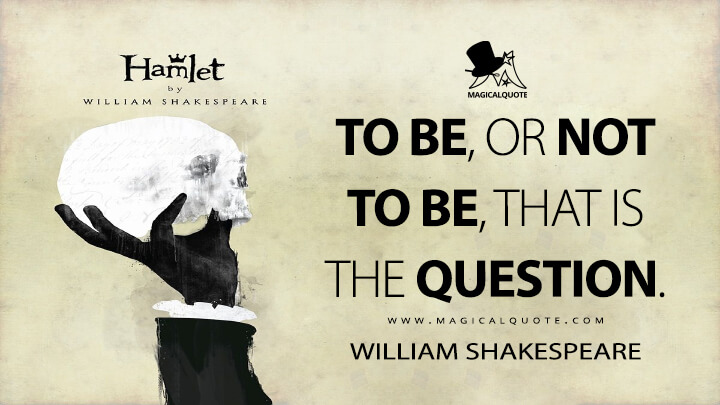To be or not to be that is the question is the most famous soliloquy in the works of Shakespeare quite possibly the most famous soliloquy in literature. The famous line that begins Prince Hamlets soliloquy in Shakespeares Hamlet To be or not to be that is the question is probably the most cited statement in all classical drama.

William Shakespeare To Be Or Not To Be That Is The
That is the question.
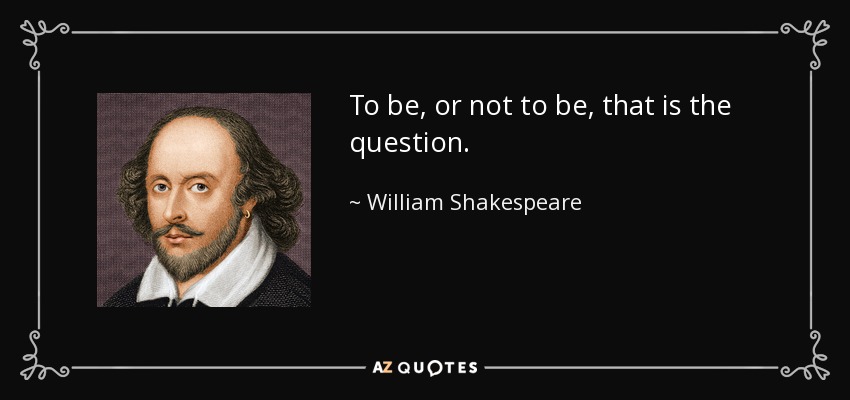
That is the question to be or not to be. So consider the crucial question now fully interpreted To be or not to be all over again. Nat Biotechnol 37 520522 2019. Movement disorders and other adverse effects may be unnoticeable on the screen yet evident in an office setting.
Any psychiatrist conducting a virtual evaluation may evaluate the chief complaint but neglect issues that the patient does not have clinical or cognitive insight of such as substance use psychosis obsessive-compulsive and related disorders eating disorders cognitive disorders etc. In Shakespeares time religious law forbade him to state that openly so he may have cloaked his understanding of the question in a fictitious drama. While this presentation will not lay to rest all ambiguities or disagreements it provides an overview and.
To BE or not to BE that is the question. Whether we hear Laurence Olivier reciting them or erroneously picture some other great Shakespearean actor pronouncing these words while holding a skull which actually belongs in the later gravedigger scene To be or not to be is one of the most famous six-line phrases from all of English literature. To be or not to be that is the question.
Whether tis nobler in the mind to suffer. To dieto sleep No more. That is the question.
If Hamlet took arms against the king a sea of troubles he would very likely lose his own life in the attempt. That is the question. And by a sleep to say we end The heart-ache and the thousand natural shocks.
Whether tis nobler in the mind to suffer. Myers 2 Stationarity in one form or another is an essential characteristic of the random function in the practice of geostatistics. Again another choice will be not to be any.
In the speech Hamlet contemplates death and suicide bemoaning the pain and unfairness of life but acknowledging that the alternative might be worse. Whether tis nobler in the mind to suffer. Shakespeare Quote - To be or not to be Hamlet.
Whether tis nobler in the mind to suffer The slings and arrows of outrageous fortune Or to take arms against a sea of troubles And by opposing end them. To be or not to be that is the question Its a line weve all heard at some point and very likely quoted as a joke but do you know where it comes from and the meaning behind the words. That is the question.
To Be or Not to Be Signaling the Aliens. The opening line is one of the most widely known and quoted lines in modern English and the soliloquy has been referenced in innumerable works of theatre literature and music. To be or not to be that is the question.
Virtually everyone knows the line To be or not to be. That Is the Question for SETI Some experts on the search for extraterrestrial intelligence say its time to send signals to the aliens while skeptics say. To be or not to be that is the question.
Finally you can settle to be all of the afore-mentioned. From Hamlet spoken by Hamlet To be or not to be that is the question. Whether tis nobler in the mind to suffer.
To be or not to be is the opening phrase of a soliloquy given by Prince Hamlet in the so-called nunnery scene of William Shakespeares play Hamlet Act 3 Scene 1. Do you want to be a friend or do you want to be befriended as a foe. I wonder if Shakespeare ever understood the real importance of that question.
Unfortunately it is a term that is both misunderstood and misused. The slings and arrows of outrageous fortune Or to take arms against a sea of troubles. The slings and arrows of outrageous fortune Or to take arms against a sea of troubles.
To be or not to be. To be or not to be. Chen J Yang B.
And by opposing end them. The slings and arrows of outrageous fortune Or to take arms against a sea of troubles Shakespeare 1599. William Shakespeare Quotes Quotable Quote.
That is the question. Whether tis nobler in the mind to suffer. Whether tis nobler in the mind to suffer The slings and arrows of outrageous fortune Or to take arms against a sea of troubles And by opposing end them.
Perhaps you want to be neither an ally nor an enemy and stay neutral. It is of course from Shakespeares play Hamlet 1602 Shakespeares actual title is - The tragedie of Hamlet Prince of Denmarke. The entire soliloquy seems applicable to the aging experience.
Whether tis nobler in the mind to suffer The slings and arrows of outrageous fortune Or to take arms against a sea of troubles And by opposing end them. And by a sleep to say we end The heart-ache and the thousand natural shocks That flesh is heir to tis a consummation. To be or not to be that is the question.
Read Hamlets famous soliloquy below with a modern translation and full explanation of the meaning of To be or not to be. Hamlet To be or not to be. To be or not to be.
To be or not to be is actually the first line of a famous soliloquy from William Shakespeares play Hamlet. Shakespeare was no fool. To be or not to be that is the question.
Certainly if asked to quote a line of Shakespeare this is the one that first comes to mind for most people. The slings and arrows of outrageous fortune Or to take arms against a sea of troubles.

Through The Looking Glass To Be Or Not To Be Is Not The Question
To Be Or Not To Be That Is The Question William Shakespeare Quotes
William Shakespeare Quotes Quotehd
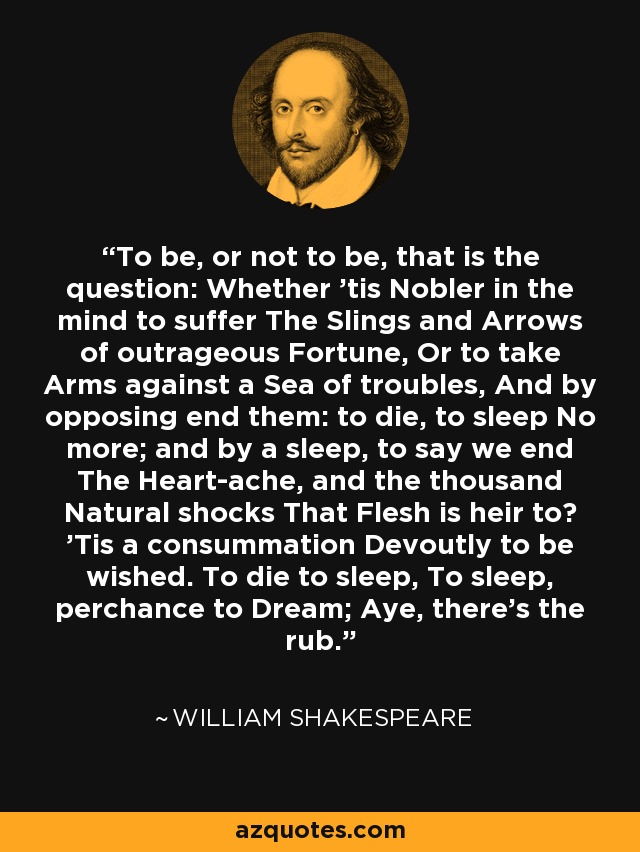
William Shakespeare Quote To Be Or Not To Be That Is The Question

To Be Or Not To Be Amratajoshi
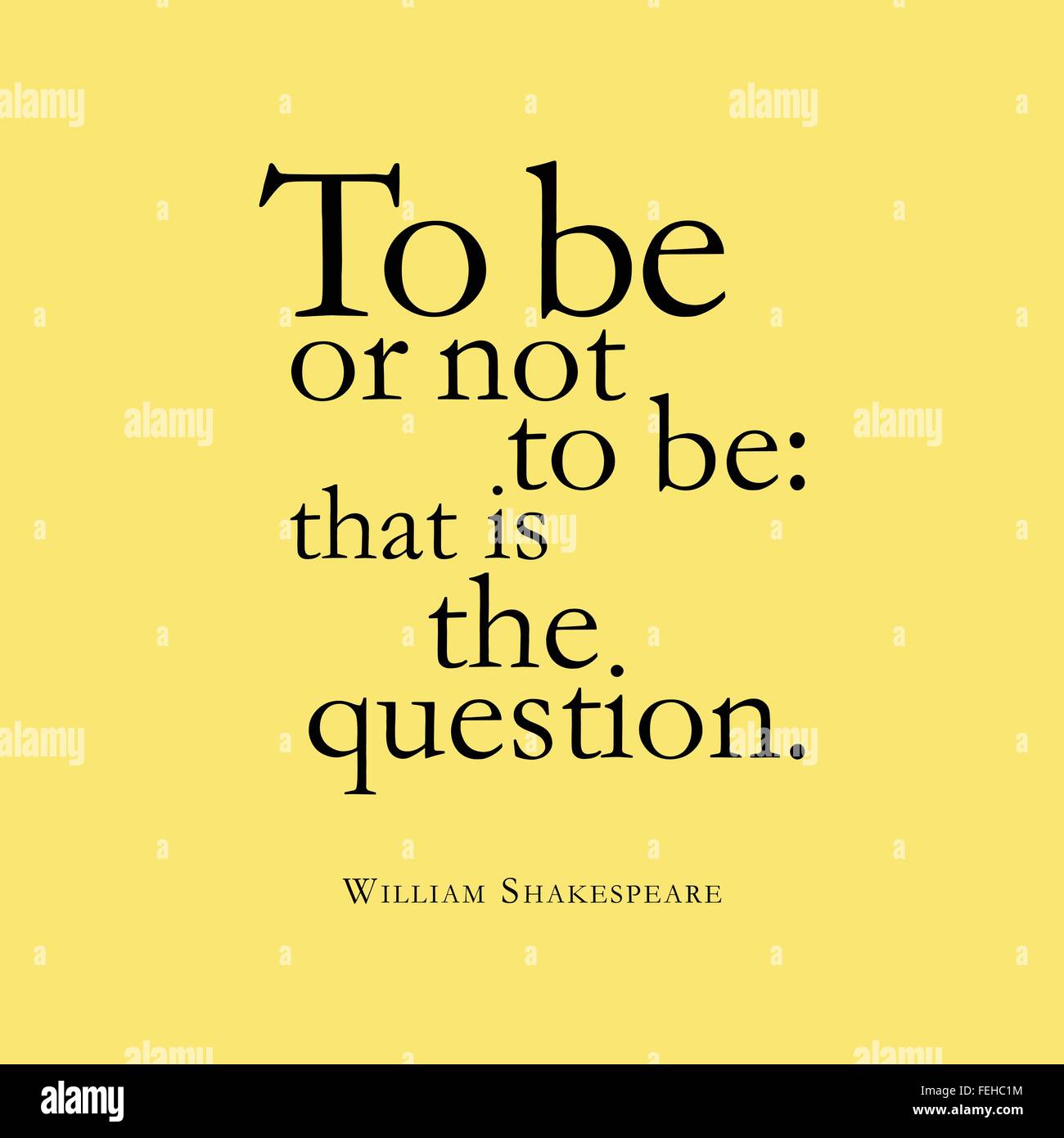
To Be Or Not To Be That Is The Question William Shakespeare Stock Vector Image Art Alamy

Quotes Shakespeare To Be Or Not To Be Quotesgram
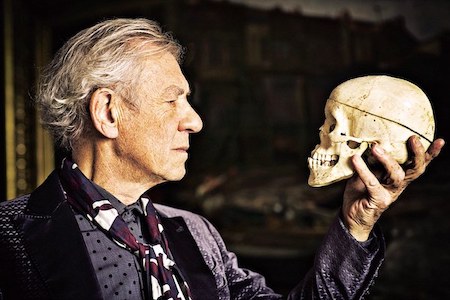
The Phrase To Be Or Not To Be That Is The Question Meaning And Origin
